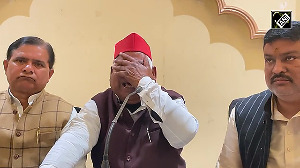Welcoming the United Nations General Assembly's decision to commence inter-governmental negotiations for expanding the powerful 15-member Security Council, India, Brazil and South Africa have said the move is necessary to make the council more democratic, legitimate, representative and responsive.
In a statement issued on Monday, foreign ministers of the three countries, partners in the India-Brazil-South Africa Dialogue Forum, said expansion in both permanent and non-permanent categories is necessary to make the council "more democratic, legitimate, representative and responsive."
They reiterated their decision to jointly pursue the assembly's decision with a view to achieving concrete results.
The statement was issued after Foreign Ministers Pranab Mukherjee, Celso Amorim of Brazil and Nkosazana Dlamini Zuma of South Africa met on the sidelines of the UNGA session to review international issues as also the cooperation among themselves.
In a major victory for India, the Open Ended Working Group, which had been unsuccessfully trying for last 15 years to bring about a consensus on the issue of expansion of the council, had decided that the inter-governmental negotiations will begin before February 28, 2009, on the basis of proposals put forward by various member states.
Pakistan and Italy-led Uniting for Consensus group had tried to block the OEWG decision to start inter-governmental negotiations, but withdrew their objection after it became clear that they lacked majority and India and their supporters were moving towards demanding a vote on the motion to go in for inter governmental negotiations.
India, Brazil, Japan, Germany and South Africa are strong contenders for a permanent seat in the council.
Currently, the United States, Britain, Russia, France and China are permanent members who form the most powerful group in the council and take most of the decisions.
The expansion in permanent category would for the first time allow the 192-member General Assembly to choose permanent members.
Analysts say the move would make new permanent members more responsive to the aspiration of the general membership, which would have selected them.
India, Japan, Germany and Brazil, known as Group of 4, have been working together for the expansion of the Security Council.
Under their proposal, the number of permanent members would increase from 5 to 11 with the addition two members each from Asia and Africa and one each from Latin America and Europe and other states group.
It also calls for increasing the number of non- permanent members from current 10 to 14 to take the total membership of the council to 25.
The expansion of the council would need an amendment in the UN charter, which will require the resolution seeking increase in the number of members be adopted by two-thirds of the majority and once adopted, it would need to be ratified by two-thirds of the membership including the five permanent members.
UFC proposal too would increase the membership to 25, but would add only non-permanent members. Pakistan argues that it does not want to create new centers of power, while India says unless the number of permanent members is increased, the decision-making structure would not change.
It points to the fact that the 10 non-permanent members have little influence on the decision making process and adding to their number would not change the situation.
Thus it would not serve the purpose and would not achieve the main purpose of making the council more democratic or ensuring that it reflects the current realities.






 © 2025
© 2025